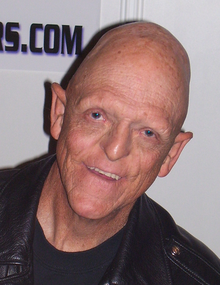Christ-Siemens-Touraine syndrome
The Christ-Siemens-Touraine syndrome ( x-linked on or hypohidrotic ectodermal dysplasia ) is a rare inherited disease that with a number of malformations of the descendants ectodermal associated tissue. It is already noticeable in childhood with the complete or partial absence of the sweat glands.
Inheritance
The syndrome occurs as X-recessive-linked mutations of the genes XLHED, EDA and ED1, which are mapped to the region Xq12-q13.1 . However, there are similar cases with autosomal dominant inheritance and with autosomal recessive transmission. The EDA gene encodes ectodysplasin-A , a protein from the family of tumor necrosis factor-α ligands. The gene product that ectodysplasin-A plays an important role in the interaction between epithelium and mesenchyme, and specifically in the development control and differentiation of the skin appendages .
Symptoms
This syndrome is a very rare hereditary disease (prevalence, sources fluctuating, around 1: 10,000 worldwide), characterized by a system dysplasia of descendants of the ectodermal tissue. The skin and its appendages (hair, nails, sweat glands and sebum ) are particularly affected .
The core symptoms are more or less pronounced hypohidrosis , hypotrichosis and hypodontia . On the dermatological side, the skin is dry, scaly, often eczematous , caused by a reduced or absent attachment of sweat and sebum glands. As a result, it can lead to a reduced sweat secretion with disturbances of the thermoregulation in the organism, which causes a strong fever , which can also lead to death.
Malformations of the head

- low set ears
- Hypoplasia of the eyelashes and eyebrows
- thin, depigmented, frizzy head hair
- periorbital pigmentation of the skin
- Bulbous lips
- Saddle nose
- Frontal cusp
Common symptoms
- flaky skin
- Disturbances in heat regulation (due to a lack of sweat glands )
- Lack of lanugo hair
Rare symptoms
literature
- E. Parsche among others: The Christ-Siemens-Touraine syndrome. Switzerland Monthly Dental Medicine, Vol. 108: 2/1998 ( PDF, 280 kB )
- JT Wright, DK Grange, MK Richter: Hypohidrotic Ectodermal Dysplasia . GeneReviews, University of Washington, Seattle 2006.
- X-linked form. In: Online Mendelian Inheritance in Man . (English)
- autosomal recessive form. In: Online Mendelian Inheritance in Man . (English)
- autosomal dominant form. In: Online Mendelian Inheritance in Man . (English)
Individual evidence
- ^ Christ-Siemens-Touraine syndrome. In: Orphanet (Rare Disease Database).